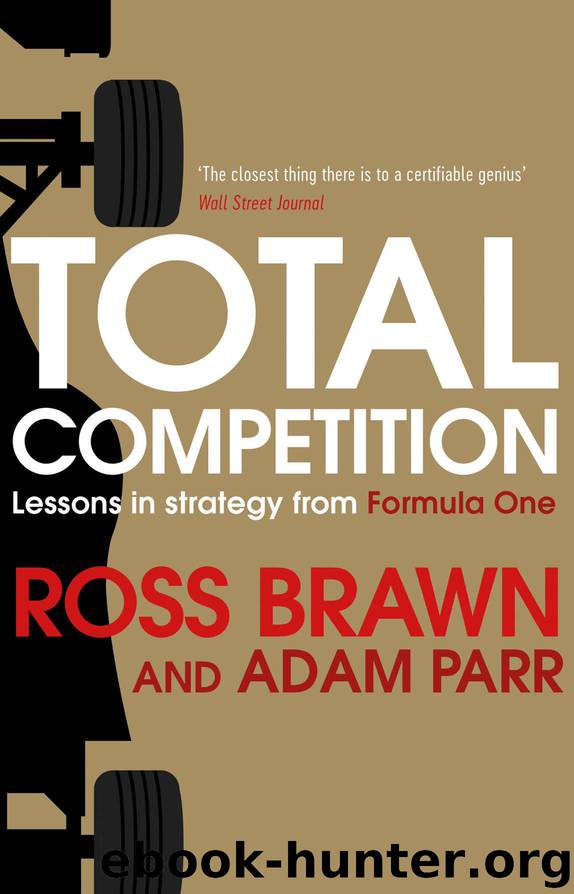Total Competition: Lessons in Strategy from Formula One by Brawn Ross & Parr Adam

Author:Brawn, Ross & Parr, Adam [Brawn, Ross]
Language: eng
Format: azw3
Publisher: Simon & Schuster UK
Published: 2016-11-03T04:00:00+00:00
STRENGTHS AND WEAKNESSES
The Sunzi emphasizes the need for a commander to know himself and know the enemy:
Hence the saying: If you know the enemy and know yourself, you need not fear the result of a hundred battles. If you know yourself but not the enemy, for every victory gained you will also suffer a defeat. If you know neither the enemy nor yourself, you will succumb in every battle. (Book III)
A This comes back to a theme we discussed last time which was that at a certain point in your career, you stop fighting the battles that you would have fought even a couple of years earlier, because you just haven’t got the energy.
So the relationship with the FIA I think is clear. When we look at the relationship with the commercial rights holder – which people would identify with Bernie Ecclestone – it is more complicated. Formula One is relatively unusual in that in most sports the regulator doesn’t matter a huge amount because they might decide how big the ball is or whether you use touchline technology, or whatever, but that doesn’t really affect anyone very much or it affects everyone the same. In Formula One the rules matter enormously, and changing the rules matters as we discussed. But the other oddity about Formula One is this three-way relationship between the teams, the regulator and the commercial rights holder. You said that earlier in your career the relationship with the commercial rights holder wasn’t your responsibility because you had people like Flavio Briatore or Luca di Montezemolo doing it. But later, when it was your responsibility at Brawn and then at Mercedes, you delegated it, largely.
R Yes.
A If we look at people in leadership positions, like everyone else they have things that they are good at and comfortable with and they have things that they don’t particularly like doing, or don’t think they should be doing, or they don’t think they are so good at. And they tend not to do those things. Unfortunately, those are the things that bite them.
But it’s a dilemma because it doesn’t mean that you should have done it, but what you probably didn’t do was to make sure that the same principles and approach that you applied with the FIA were also applied with the commercial rights holder.
R I think you are absolutely right.
A So, if you were about to go back into Formula One, what would you do differently?
R I think the point you touched on, was that I was running out of energy to have those battles, those wars and in some ways not just the wars but the time you need to put in to nurture those relationships. I had put in the miles, I had done the work and I had enjoyed my relationship with the FIA. They are genuinely enjoyable people. Charlie Whiting has been in motor racing a long time. He was a chief mechanic when I was a mechanic. We just have a background.
Bernie operated in a different sphere to the one that I was most comfortable with.
Download
This site does not store any files on its server. We only index and link to content provided by other sites. Please contact the content providers to delete copyright contents if any and email us, we'll remove relevant links or contents immediately.
Imperfect by Sanjay Manjrekar(5864)
Wiseguy by Nicholas Pileggi(5762)
The Body: A Guide for Occupants by Bill Bryson(5070)
Tuesdays with Morrie by Mitch Albom(4762)
Unstoppable by Maria Sharapova(3518)
Not a Diet Book by James Smith(3405)
Crazy Is My Superpower by A.J. Mendez Brooks(3386)
Into Thin Air by Jon Krakauer(3382)
The Mamba Mentality by Kobe Bryant(3256)
The Fight by Norman Mailer(2922)
Finding Gobi by Dion Leonard(2831)
Tuesdays With Morrie by Mitch Albom(2744)
The Ogre by Doug Scott(2677)
My Turn by Johan Cruyff(2616)
Unstoppable: My Life So Far by Maria Sharapova(2492)
Accepted by Pat Patterson(2361)
Everest the Cruel Way by Joe Tasker(2327)
Borders by unknow(2300)
Open Book by Jessica Simpson(2257)
